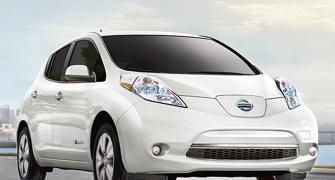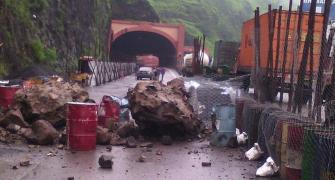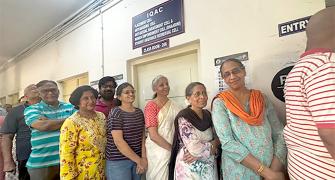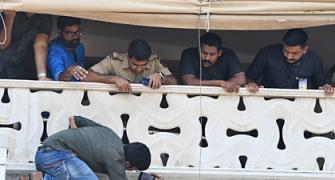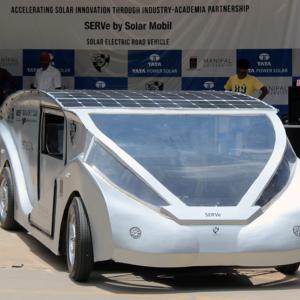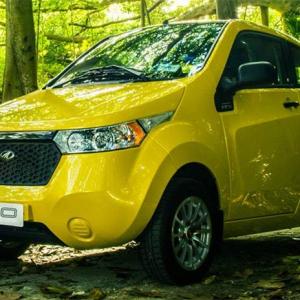Hemlatha Annamalai and P Bala's Ampere Vehicles makes e-vehicles in Coimbatore. Do they have a strong business case?

Ratan Tata, chairman emeritus of Tata Sons, is a venerable name in the world of startups and angel investors.
He has invested in a string of e-commerce startups and one automobile company: Coimbatore-based Ampere Vehicles, the maker of electric two- and three-wheelers.
The company's factory is in the midst of a coconut farm, away from downtown Coimbatore.
The entrance is guarded not by an electronically-controlled barricade, but by a hand-operated wooden barrier, which a middle-aged guard lifts by untying a knot from a coconut tree.

Inside, all is quiet: there's no deafening noise of machines. Hemlatha Annamalai, Ampere's CEO, dressed in dark blue trousers and a blue shirt, sits on a sofa from where she can see the verdant coconut trees.
Annamalai, who belongs to Chennai and studied at the Government College of Technology at Coimbatore, moved to Singapore after her marriage to P Bala when she was 27 and became an entrepreneur.
The idea to work on e-vehicles took root in 2007, when at a conference she heard a Toyota executive saying that the time for internal combustion engines was over.
 She and Bala got thinking: if China could sell about 30 million e-vehicles (annually back then), then why not India?
She and Bala got thinking: if China could sell about 30 million e-vehicles (annually back then), then why not India?
Later, at the international mobility forum in Switzerland, she got a better perspective about e-engines. "I didn't just jump into this business; I did a lot of research and homework," says Annamalai.
In 2008, the couple sold their $1.8-million apartment in Singapore and moved to Coimbatore with their two school-going daughters to set up Ampere. (The name came from Andre-Marie Ampere who theorised the science of classical electromagnetism.)
Bala is an engineer but neither Annamalai nor he had tried to build or sell an e-vehicle before this. They were entering a tricky area.
 Some big original equipment manufacturers had tried e-bikes, but those were not doing well. Ampere was foraying into a market where the technology, product and concept were all new.
Some big original equipment manufacturers had tried e-bikes, but those were not doing well. Ampere was foraying into a market where the technology, product and concept were all new.
Annamalai recollects that in 2010, when they were trying to raise money, financiers not only turned them away but also openly discouraged them. "They disqualified us," she says.
The couple slogged on, researching and trying to master the technology and the algorithms. Then, Forum Synergies and Spain's Axon Capital jointly invested around Rs 20 crore (Rs 200 million) in Ampere.
Next came Tata's investment. "This is not only an endorsement for the company but also for the entire electric vehicle industry," says Annamalai.
 Expansion plans
Expansion plans
The company now wants to mobilise around Rs 20 crore to scale up operations, hire talent and invest in research and development. The idea is to make the products 100 per cent indigenous, compared to 75 per cent currently.
The business case for e-vehicles looks strong: sales have grown at a fast clip, albeit from a low base.
According to the Society of Manufactures of Electrical Vehicles, sales increased 25 per cent to about 5,000 in the June-ended quarter from the year-ago quarter. "Government subsidies that benefit consumers directly triggered the sales," says Sohinder Gill, director (corporate affairs), SMEV.
 Under its Faster Adoption and Manufacturing of Electric Vehicles scheme, the central government will also assist e-vehicle manufacturers with Rs 795 crore (Rs 7.95 billion) till 2020 to help them create infrastructure and R&D facilities.
Under its Faster Adoption and Manufacturing of Electric Vehicles scheme, the central government will also assist e-vehicle manufacturers with Rs 795 crore (Rs 7.95 billion) till 2020 to help them create infrastructure and R&D facilities.
But the success of e-vehicles will depend on their price tags. At the end of the day, the total cost of ownership should work out favourably for the buyer.
Ampere's e-cycle costs around Rs 23,500, and its e-scooter is priced at Rs 40,000-45,000. This is Rs 7,000-8,000 costlier than its competitors.
 The company says this is because its two-wheelers come with a 60-volt battery and hence perform better, while others run on 40 volts. A dealer with a rival electric vehicle firm, however, argues that the performance is pretty much the same.
The company says this is because its two-wheelers come with a 60-volt battery and hence perform better, while others run on 40 volts. A dealer with a rival electric vehicle firm, however, argues that the performance is pretty much the same.
Ampere's customers are farmers and small-time businessmen who use these vehicles to transport their produce to the local markets.
Business to Business (B2B) customers, largely mill-owners in and around Coimbatore, also use its vehicles. Recently, corporations too have started using the vehicles to collect garbage.
 User testimonials
User testimonials
P Venkatachalam, a farmer from Pollachi (45 km from Coimbatore) who bought an Ampere e-cycle about one-and-a-half years ago, says the experience was "satisfactory"; so, he's now bought Ampere's e-scooter called the V60. Venkatachalam drives the scooter for nearly 50 km in a day, and says it costs him around Rs 5 to charge the battery.
But given the long power cuts, isn't it difficult to regularly charge the battery? "Not really," Vankatachalam says, "Besides, the cycle's battery, which comes with a one-year guarantee, helps when the power goes off. A small tube light and a fan can run on it for a few hours."
 Once charged, the e-cycle can run up to 45 km and the e-scooter to 60 km, he says. The vehicles can carry a load of up to 150 kg at a speed of 40 km per hour.
Once charged, the e-cycle can run up to 45 km and the e-scooter to 60 km, he says. The vehicles can carry a load of up to 150 kg at a speed of 40 km per hour.
The battery needs 6 to 7 hours and about 1.8 units of power to be fully charged, says Kalimuthu, who is in charge of Ampere's dispatch department.
If maintained well, it can last for about three years during which it can be charged 750 times. Though a new battery costs Rs 15,000, in three years an e-vehicle proves to be still cheaper than a petrol or diesel version, says Kalimuthu.
Currently the company has 47 dealers across southern states and hopes to add another 20 in the next two months. It has a presence in Tamil Nadu, Kerala and Karnataka and will soon expend operations to Andhra Pradesh, and intends to operate only in South India.
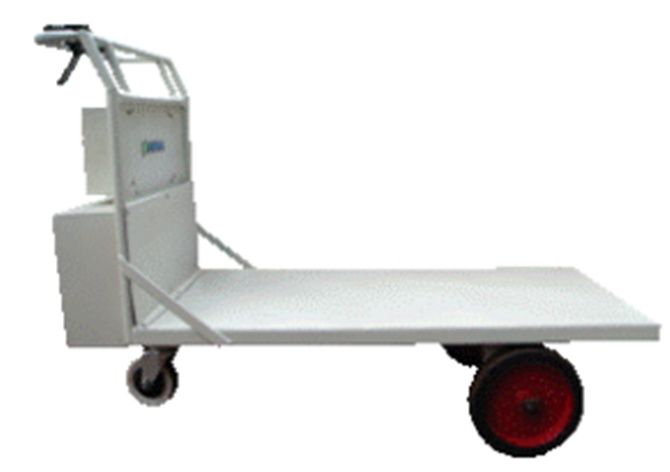 Recently, it received its first export order for e-trolleys capable of carrying a load of 600 kg.
Recently, it received its first export order for e-trolleys capable of carrying a load of 600 kg.
But it's still a while before e-vehicles become popular. Annamalai says that will happen only once volume picks up and bank financing to customers becomes easier. She says it will be another two to three years, at least, before the company will start making profits.


